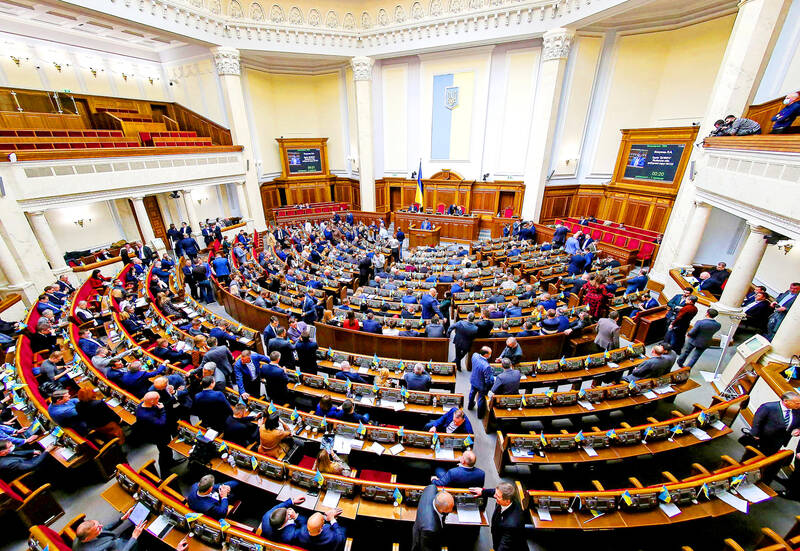The Chinese embassy in Ukraine attempted to thwart the Ukrainian parliament’s plan to establish a pro-Taiwan group, Newsweek magazine reported on Saturday.
Ukraine’s parliament on Aug. 17 launched the Taiwan Friendship Group, which is led by Foreign Affairs Committee Chairman Oleksandr Merezhko and consists of 15 lawmakers, two-thirds of whom belong to the ruling party.
Newsweek reported that “a diplomatic dispute is brewing between Ukraine and China” as Beijing lodged a protest against the newly established group at the Ukrainian embassy in China last week.

Photo: Reuters
Merezhko was quoted as saying that China is “trying to dictate what a foreign parliament should do,” adding that he turned down a request to meet with Chinese Ambassador to Ukraine Fan Xianrong (范先榮) prior to the initiation of the group.
He said that Fan refused to meet with him and his colleagues in March when they tried to solicit China’s support for humanitarian corridors amid Russia’s invasion of the nation, the magazine reported.
China’s indifference to Ukraine motivated the parliament to set up the group, he added.
After the group was launched, Fan complained to several senior members of the Servant of the People ruling party, but nobody put pressure on members of the group, Merezhko said.
Fan might be worried that Ukraine would send a delegation to Taiwan following the lead of US House of Representatives Speaker Nancy Pelosi earlier this month, he said.
Ukrainian lawmaker Inna Sovsun, another member of the group and a long-term supporter of Taiwan, said that “China is worried Ukraine’s defense against Russia could become a model for Taiwanese resistance against China,” the magazine reported.
The biggest concern for Beijing is the similarity between Ukraine and Taiwan, as they are “two smaller countries fighting against colonialism,” she was quoted as saying.
She said that group members “coordinated the creation of the group through different layers of government” so as not to cause trouble for the executive.
The executive departments of foreign governments are likely to be constrained by diplomatic ties with Beijing or the “one China” policy, while legislative departments have more freedom to act, Newsweek said.
Analysts say that the Ukrainian government is hesitant to support Taiwan publicly because it does not want to see China taking Russia’s side in the war.
“I do not see the potential of the Chinese helping Ukraine. What we want from them is not to help Russia,” Sovsun was quoted by Newsweek as saying.

Seventy percent of middle and elementary schools now conduct English classes entirely in English, the Ministry of Education said, as it encourages schools nationwide to adopt this practice Minister of Education (MOE) Cheng Ying-yao (鄭英耀) is scheduled to present a report on the government’s bilingual education policy to the Legislative Yuan’s Education and Culture Committee today. The report would outline strategies aimed at expanding access to education, reducing regional disparities and improving talent cultivation. Implementation of bilingual education policies has varied across local governments, occasionally drawing public criticism. For example, some schools have required teachers of non-English subjects to pass English proficiency

‘FORM OF PROTEST’: The German Institute Taipei said it was ‘shocked’ to see Nazi symbolism used in connection with political aims as it condemned the incident Sung Chien-liang (宋建樑), who led efforts to recall Democratic Progressive Party (DPP) Legislator Lee Kun-cheng (李坤城), was released on bail of NT$80,000 yesterday amid an outcry over a Nazi armband he wore to questioning the night before. Sung arrived at the New Taipei City District Prosecutors’ Office for questioning in a recall petition forgery case on Tuesday night wearing a red armband bearing a swastika, carrying a copy of Adolf Hitler’s Mein Kampf and giving a Nazi salute. Sung left the building at 1:15am without the armband and apparently covering the book with a coat. This is a serious international scandal and Chinese

TRADE: The premier pledged safeguards on ‘Made in Taiwan’ labeling, anti-dumping measures and stricter export controls to strengthen its position in trade talks Products labeled “made in Taiwan” must be genuinely made in Taiwan, Premier Cho Jung-tai (卓榮泰) said yesterday, vowing to enforce strict safeguards against “origin laundering” and initiate anti-dumping investigations to prevent China dumping its products in Taiwan. Cho made the remarks in a discussion session with representatives from industries in Kaohsiung. In response to the US government’s recent announcement of “reciprocal” tariffs on its trading partners, President William Lai (賴清德) and Cho last week began a series of consultations with industry leaders nationwide to gather feedback and address concerns. Taiwanese and US officials held a videoconference on Friday evening to discuss the

PERSONAL DATA: The implicated KMT members allegedly compiled their petitions by copying names from party lists without the consent of the people concerned Judicial authorities searched six locations yesterday and questioned six people, including one elderly Chinese Nationalist Party (KMT) member and five KMT Youth League associates, about alleged signature forgery and fraud relating to their recall efforts against two Democratic Progressive Party (DPP) legislators. After launching a probe into alleged signature forgery and related fraud in the KMT’s recall effort, prosecutors received a number of complaints, including about one petition that had 1,748 signatures of voters whose family members said they had already passed away, and also voters who said they did not approve the use of their name, Taipei Deputy Chief Prosecutor